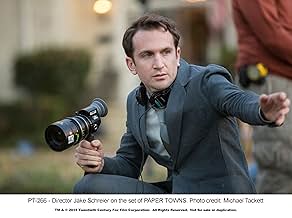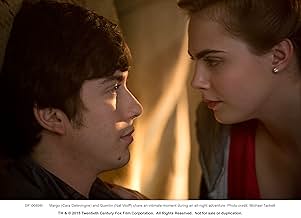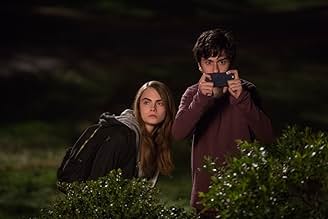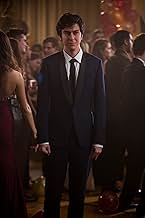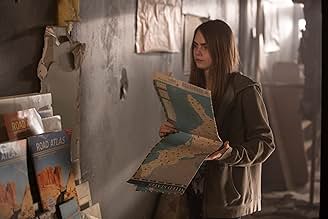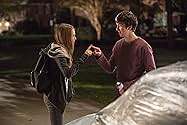VALUTAZIONE IMDb
6,2/10
110.279
LA TUA VALUTAZIONE
Dopo un'avventura che dura tutta la notte, la cotta di tutta la vita di Quentin, Margo, scompare, lasciando dietro di sé indizi che Quentin e i suoi amici seguono.Dopo un'avventura che dura tutta la notte, la cotta di tutta la vita di Quentin, Margo, scompare, lasciando dietro di sé indizi che Quentin e i suoi amici seguono.Dopo un'avventura che dura tutta la notte, la cotta di tutta la vita di Quentin, Margo, scompare, lasciando dietro di sé indizi che Quentin e i suoi amici seguono.
- Regia
- Sceneggiatura
- Star
- Premi
- 4 vittorie e 3 candidature totali
Hannah Riley
- Young Margo
- (as Hannah Alligood)
Recensioni in evidenza
Reviewed by: Dare Devil Kid (DDK)
Rating: 3.4/5 stars
"Paper Towns" isn't as deep or moving as it wants to be, yet it's still earnest, well-acted, and thoughtful enough to earn a place in the hearts of teen filmgoers of all ages while providing a breezy, light-hearted nostalgic trip for adult viewers. Unlike "The Fault in Our Stars" (the first, big-screen John Green adaptation), the overall mood here is safe rather than edgy, but what it does do very effectively is capture a particular quality of adolescent yearning.
"Paper Towns" follows the familiar story of the wannabe high- schooler who meets a dreamy girl and everything falls into place. Trying to subvert this stereotypical storyline, the film neatly weaves themes of loneliness, fear, depression, and anxiety into the plot. The film takes a lot of the original spirit of the novel while subverting the story, taking out all the meandering teenage angst and replacing it with a fun, understated film.
It's eventually a bittersweet teen film with much to offer even those of us who have, in theory, grown up, although it never quite reaches its potential of a remarkable coming-of-age drama.
Rating: 3.4/5 stars
"Paper Towns" isn't as deep or moving as it wants to be, yet it's still earnest, well-acted, and thoughtful enough to earn a place in the hearts of teen filmgoers of all ages while providing a breezy, light-hearted nostalgic trip for adult viewers. Unlike "The Fault in Our Stars" (the first, big-screen John Green adaptation), the overall mood here is safe rather than edgy, but what it does do very effectively is capture a particular quality of adolescent yearning.
"Paper Towns" follows the familiar story of the wannabe high- schooler who meets a dreamy girl and everything falls into place. Trying to subvert this stereotypical storyline, the film neatly weaves themes of loneliness, fear, depression, and anxiety into the plot. The film takes a lot of the original spirit of the novel while subverting the story, taking out all the meandering teenage angst and replacing it with a fun, understated film.
It's eventually a bittersweet teen film with much to offer even those of us who have, in theory, grown up, although it never quite reaches its potential of a remarkable coming-of-age drama.
"Paper Towns" is that kid in the lunchroom who acts different and seems cool but it isn't until you talk to him that you realize he adheres to all the social conventions and routines of life that you thought he was rebelling against. It's the kind of film that feels like it was written by an adolescent girl cherrypicking reblogged Tumblr quotes from her wall to suffice as the theme for the film. It's the kind of film you'll love if you find the idea of "getting lost to find yourself" a profound concept.
"Paper Towns," finally, is the kind of film where the love interest is named Margo Roth Spiegelman (Cara Delevingne), whose vacuous personality is mistaken for mystery and enigma. She is defined by her absent gazes into the world, her love for "random capitalization" in her writing because "the rules are so unfair to the letters in the middle of words," and her statements about her town, Orlando, Florida, being a paper town with "paper houses and paper people."
She also happens to be the apple of Quentin's (the former "Naked Brothers Band" lead singer Nat Wolff) eye since she moved in his subdivision when they were young; he considers living next to her his sole miracle in life. However, the two have significantly drifted since their youthful days of innocence, until one night when Margo climbs into his window and says that she has nine things to do that night and needs a getaway driver. Stunned that the love of his life has waltzed through his window for the first time in years, Quentin takes Margo and peels off in his minivan to exact revenge on Margo's cheating boyfriend and her friends who didn't help her in her time of need.
Upon having the greatest night of his life, Quentin wakes up the next morning and sees Margo isn't at school that day, and eventually, notices she's missing the entire week. Her parents aren't concerned, for Margo does this a lot, but Quentin and his friends - the incessant Ben (Austin Abrams) and the geeky "Radar" (Justice Smith) - begin to uncover clues as to why Margo may have disappeared and where to. With that, the three teens, including Margo's best friend Lacey (Halston Sage) and Radar's girlfriend Angela (Jaz Sinclair), try to track down her whereabouts.
"Paper Towns"'s immediate problem is it's nowhere as intelligent or witty as it thinks it is. Its themes are all rehashed to the point of breeding contempt and its characters, particularly Margo, are so broadly drawn that they work against the film, which is clearly trying to breathe that fabled freshness into the teen film genre (it always feels like Quentin's going to stop the film with his narration saying the dreaded "this isn't your average teen movie" line).
Strangely, though, the most contemptible character throughout this whole film is Margo for more reasons than her empty personality. She's the kind of person who thinks it's okay to drop her friends and family without giving them any inkling as to what's wrong with her because she's trying to find herself. Finally, when somebody does something for her, particularly Quentin, she takes it with a grain of salt and goes about selfishly trying to advance herself rather than consider what she means to others. She's on the verge of growing up and being Amy Schumer's Amy character from "Trainwreck," a contemptible, lost soul who takes advantage of people she meets.
Furthermore, the humor of "Paper Towns" is another thing that's frustrating. One moment, the film is trying to wow you with a "deep" dialogue about what lies beneath the surface of people, and the next, a character accidentally spills a can in which he urinated into all over himself and his friends. Once more, this is a film that's trying to be one thing but can't escape what it ultimately is: trite, frequently immature, and mostly empty exercise that has nothing revolutionary to say despite thinking it does.
However, don't fault the cast here, for they clearly give it their best shot. Their energy and charisma bring to life more than writers Scott Neustadter and Michael H. Weber (who wrote "The Spectacular Now," a film you should see instead of this one) do. Nat Wolff, an actor I've consistently admired for his good-natured, everyboy appearance and personality, does strong work here in that realm and is assisted by capable performers like Smith and Sage (Delevingne would likely be better if she had a character to play).
"Paper Towns" is cut from the same cloth as "The Fault in Our Stars" (author John Green, who wrote the book on which this film is based, also wrote that one and Neustadter and Weber also penned that screenplay) in that it tries to take a different direction for its adolescent characters but crumbles under the lackluster deviations from reality it so often takes. On top of that, unlike "The Fault in Our Stars," which was burdened by sentimentality and cringeworthy attempts at a perceived coolness, "Paper Towns" winds up being precisely what it didn't want to be - a paper film.
"Paper Towns," finally, is the kind of film where the love interest is named Margo Roth Spiegelman (Cara Delevingne), whose vacuous personality is mistaken for mystery and enigma. She is defined by her absent gazes into the world, her love for "random capitalization" in her writing because "the rules are so unfair to the letters in the middle of words," and her statements about her town, Orlando, Florida, being a paper town with "paper houses and paper people."
She also happens to be the apple of Quentin's (the former "Naked Brothers Band" lead singer Nat Wolff) eye since she moved in his subdivision when they were young; he considers living next to her his sole miracle in life. However, the two have significantly drifted since their youthful days of innocence, until one night when Margo climbs into his window and says that she has nine things to do that night and needs a getaway driver. Stunned that the love of his life has waltzed through his window for the first time in years, Quentin takes Margo and peels off in his minivan to exact revenge on Margo's cheating boyfriend and her friends who didn't help her in her time of need.
Upon having the greatest night of his life, Quentin wakes up the next morning and sees Margo isn't at school that day, and eventually, notices she's missing the entire week. Her parents aren't concerned, for Margo does this a lot, but Quentin and his friends - the incessant Ben (Austin Abrams) and the geeky "Radar" (Justice Smith) - begin to uncover clues as to why Margo may have disappeared and where to. With that, the three teens, including Margo's best friend Lacey (Halston Sage) and Radar's girlfriend Angela (Jaz Sinclair), try to track down her whereabouts.
"Paper Towns"'s immediate problem is it's nowhere as intelligent or witty as it thinks it is. Its themes are all rehashed to the point of breeding contempt and its characters, particularly Margo, are so broadly drawn that they work against the film, which is clearly trying to breathe that fabled freshness into the teen film genre (it always feels like Quentin's going to stop the film with his narration saying the dreaded "this isn't your average teen movie" line).
Strangely, though, the most contemptible character throughout this whole film is Margo for more reasons than her empty personality. She's the kind of person who thinks it's okay to drop her friends and family without giving them any inkling as to what's wrong with her because she's trying to find herself. Finally, when somebody does something for her, particularly Quentin, she takes it with a grain of salt and goes about selfishly trying to advance herself rather than consider what she means to others. She's on the verge of growing up and being Amy Schumer's Amy character from "Trainwreck," a contemptible, lost soul who takes advantage of people she meets.
Furthermore, the humor of "Paper Towns" is another thing that's frustrating. One moment, the film is trying to wow you with a "deep" dialogue about what lies beneath the surface of people, and the next, a character accidentally spills a can in which he urinated into all over himself and his friends. Once more, this is a film that's trying to be one thing but can't escape what it ultimately is: trite, frequently immature, and mostly empty exercise that has nothing revolutionary to say despite thinking it does.
However, don't fault the cast here, for they clearly give it their best shot. Their energy and charisma bring to life more than writers Scott Neustadter and Michael H. Weber (who wrote "The Spectacular Now," a film you should see instead of this one) do. Nat Wolff, an actor I've consistently admired for his good-natured, everyboy appearance and personality, does strong work here in that realm and is assisted by capable performers like Smith and Sage (Delevingne would likely be better if she had a character to play).
"Paper Towns" is cut from the same cloth as "The Fault in Our Stars" (author John Green, who wrote the book on which this film is based, also wrote that one and Neustadter and Weber also penned that screenplay) in that it tries to take a different direction for its adolescent characters but crumbles under the lackluster deviations from reality it so often takes. On top of that, unlike "The Fault in Our Stars," which was burdened by sentimentality and cringeworthy attempts at a perceived coolness, "Paper Towns" winds up being precisely what it didn't want to be - a paper film.
The first twenty minutes absolutely blew me away, totally enjoyable, when she'd disappeared I honestly thought it was going to be a kind of Gone Girl thriller, wrong, it fell somewhere between Road Trip and the Goonies. After adjusting to what essentially became a teenage road trip movie I kind of enjoyed it, there were some entertaining moments. I couldn't help feeling a little bit robbed, it had been set up so well, it literally felt like a different film after her disappearance.
The ending at least was one that decided not to pander to audience satisfaction, a little sour but interesting. As always with this kind of film the usual clichés are there in full, point zero as is the rule is the prom, they always have to be motivated by the prom.
Interesting casting, Nat Wolff was very good as Quentin, he didn't overplay it, very enjoyable. I will applaud the decision to cast Cara as Margo, maybe not the top of many lists but I felt her personality and natural self gave Margo her enigma and mysterious edge, I thought she was very good, the accent slipped to English on a few occasions, but that can be forgiven, I hope it's a springboard for her I like her.
6/10 It was good, it should have been so much more.
The ending at least was one that decided not to pander to audience satisfaction, a little sour but interesting. As always with this kind of film the usual clichés are there in full, point zero as is the rule is the prom, they always have to be motivated by the prom.
Interesting casting, Nat Wolff was very good as Quentin, he didn't overplay it, very enjoyable. I will applaud the decision to cast Cara as Margo, maybe not the top of many lists but I felt her personality and natural self gave Margo her enigma and mysterious edge, I thought she was very good, the accent slipped to English on a few occasions, but that can be forgiven, I hope it's a springboard for her I like her.
6/10 It was good, it should have been so much more.
Paper Towns is another coming-of-age story about Quentin and his neighbour Margo and how here mysterious disappearance sends Quentin on a journey to find her through clues she left behind for him. Now i love a good coming-of-age story, so when one is done right and is new and interesting it will probably be something i choose to watch more than once. Unfortunately this will not be one i am eager to re-watch but it is still a good, strong attempt at one of these films but it seems to get lost a few times along the way in terms of its storytelling. I'll start with the characters and performances, because i feel they were definitely the best parts of the film and added so much to making the film pretty enjoyable. Nat Wolff was great at playing Quentin, a shy awkward guy who had a signs of a lot of personality but needed the right people to bring it out. You really get to connect with his character as they made him come across as very real and not like a character per se. I may say that often but there are so many young actors really showing off their best stuff in these smaller personal films. Cara Delevingne was also great as Margo who was also quite odd and mysterious but was also very out there and confident at the same time, a great contrast to Nat's character. The rest of the supporting cast were also well acted, their distinct personalities were at times used for some cheap comedic relief but also had a greater purpose in adding to the complexity of our main character.
The first act of this film is really where the film gets to shine. You get the introduction to these characters (Quentin and Margo) and get to see their relationship and how it has changed and affected both these characters in the lead up to the events in the film. Watching them interact and bond was fascinating and charming at times and was a really good lead up into the events of the second act and understanding their actions. It was fun, light-hearted and was setting itself up for something great. All of the events so far had a fluid lead in to the second act which became more of a mysterious adventure whilst still trying to maintain that fun element somewhat unsuccessfully. The events of the first act are what get you through the very long second act that could have been cut down like 20 minutes. The second act was more focused on building up Quentin's character and having him face some tough and new decisions in his life. Although it was interesting and you do want to see where his character goes it was a noticeable step down from the fun light-hearted enjoyment in the beginning. There was this great interesting relationship set up and you are eager to find out how the film ties everything together, then you reach the third act and all of the storytelling falls apart.
For certain characters, their actions and reactions seem somewhat justified but for some others they just felt like another character entirely. There was nothing in the second act that really explained how or why these characters made such a drastic change in reasoning or personality. They try to explain it in the dying minutes but it was very rushed and didn't fit with the rest of the film. The problem was that there was no real progression from the events of the beginning to the events in the end for some characters and that led me to believe that the writers/directors knew how to approach certain sections but were completely lost for others. I believe, they knew how they wanted the film to begin and how to introduce these characters, and they also knew how they wanted it to end and what themes they wanted to explore. But what they didn't know was how to show that transition, and when a film has the beginning, and has the end it can be hard to fill in the guts of the film afterwards and show a distinct character progression. That's just my theory but whatever happened the storytelling was a bit of a mess.
That being said, it was still a good enjoyable film that tried too hard to be different or maybe not hard enough. It had great characters and performances, a fantastic first act, an interesting second act and a third act that didn't live up to what the rest of the film was building up to. Humour didn't really work that often but kept the film from becoming too dark, and there were signs of emotion but nothing that really affects you. In the end, it's enjoyable but there are better coming-of-age films out there (Boyhood / Me and Earl and the Dying Girl). - 6.3
The first act of this film is really where the film gets to shine. You get the introduction to these characters (Quentin and Margo) and get to see their relationship and how it has changed and affected both these characters in the lead up to the events in the film. Watching them interact and bond was fascinating and charming at times and was a really good lead up into the events of the second act and understanding their actions. It was fun, light-hearted and was setting itself up for something great. All of the events so far had a fluid lead in to the second act which became more of a mysterious adventure whilst still trying to maintain that fun element somewhat unsuccessfully. The events of the first act are what get you through the very long second act that could have been cut down like 20 minutes. The second act was more focused on building up Quentin's character and having him face some tough and new decisions in his life. Although it was interesting and you do want to see where his character goes it was a noticeable step down from the fun light-hearted enjoyment in the beginning. There was this great interesting relationship set up and you are eager to find out how the film ties everything together, then you reach the third act and all of the storytelling falls apart.
For certain characters, their actions and reactions seem somewhat justified but for some others they just felt like another character entirely. There was nothing in the second act that really explained how or why these characters made such a drastic change in reasoning or personality. They try to explain it in the dying minutes but it was very rushed and didn't fit with the rest of the film. The problem was that there was no real progression from the events of the beginning to the events in the end for some characters and that led me to believe that the writers/directors knew how to approach certain sections but were completely lost for others. I believe, they knew how they wanted the film to begin and how to introduce these characters, and they also knew how they wanted it to end and what themes they wanted to explore. But what they didn't know was how to show that transition, and when a film has the beginning, and has the end it can be hard to fill in the guts of the film afterwards and show a distinct character progression. That's just my theory but whatever happened the storytelling was a bit of a mess.
That being said, it was still a good enjoyable film that tried too hard to be different or maybe not hard enough. It had great characters and performances, a fantastic first act, an interesting second act and a third act that didn't live up to what the rest of the film was building up to. Humour didn't really work that often but kept the film from becoming too dark, and there were signs of emotion but nothing that really affects you. In the end, it's enjoyable but there are better coming-of-age films out there (Boyhood / Me and Earl and the Dying Girl). - 6.3
"Maybe all the strings inside of him broke."
Walking into the cinema... John Green is the author for this teen drama. Can this film rise above the typical coming of age films?
Overall rating: 3.5 stars Cinematic value: 4 stars Big Questions value: 3 stars
Coming of age films are not new to the cinematic landscape, but Hollywood manages to propagate a new batch for each generation. Every once and a while, one stands out from the rest. From Rebel Without a Cause to Say Anything to Breakfast Club, this genre has provided positive memories and the lines that resonate throughout our younger years. Paper Towns and author John Green have struck this cord and provide a voice for this generation. The high school journey of Quentin (Nat Wolff) and his mysterious neighbour Margo (Cara Delevingne) is an adaptation of the Green novel. Quentin and Margo are friends throughout their childhood but have grown apart over the years. Then on a fateful night during their last year of high school, Margo asks Quentin for his help on a mission of revenge against friends who have done her wrong. The midnight escapade becomes a life-changing event for Quentin and he begins to pine after Margo again, then she mysteriously disappears. Family and friends want to know where she went and the mystery deepens as Quentin finds clues about her whereabouts that Margo left behind. He recruits his band of friends to take the road trip of a life time to find this teenage runaway. Throughout the life-transitory road trip, Quentin finds out more about himself, his relationships with his friends and what to do with his misplaced love of the mysterious Margo.
Throughout the opening moments of Paper Towns it feels like it was going down the predictable coming of age narrative. Boy meets girl, girl lives across the street, girl lives an adventurous life and boy pines after her from a distance. Quickly, director Jake Schreier (Robot and Frank) pulls the story out of the hormonal malaise and into the kaleidoscope of different expectations. His lead characters provide an unexpected depth. Nat Wolff and Cara Delevingne were perfectly cast in this teen mystery. Wolff proves to have a John Cusack (Say Anything) quality that makes him appealing as the average boy that proves cool in the end, while Delevingne provides enough smouldering excitement to make her worth this young man's pursuit. They are surrounded by a wonderful cast of characters that compliment the comedic dialogue and the contemplative moments of the script. This is where the film differentiates itself within this genre. Even within the stereotypical trappings of the party scene, suggested teen sex and proverbial geek trio, the writing lifts the story line out of the post-pubescent mire. It may seem unrealistic to think that teens could speak at the depth that they do in Paper Towns, but the characters make these lines plausible and accessible. There is a maturity with a twist of hormonal angst that gives this story the necessary edge it needs. Also, the conclusion adds the unique twist that provides a surprising satisfaction to the adventure.
In the realm of teen dramas, Paper Towns does provide a new perspective on a generation, but if there are any difficulties with the film it was in the lack of parental involvement. In the typical American high-school scenarios, the lack of representation by the parents in the film does leave a hole in the narrative. The only people who seem to speak into the lives of these kids are other kids. This might be an insight on the lives of families today or a warning signal for parents to get more involved in the lives of their children. Regardless of the message that is trying to convey, the lack of any adult wisdom does leave a void in this engaging script. Paper Towns is an entertaining film that provides an opportunity for parental dialogue with their teens on many of the transitional issues of their lives.
Leaving the cinema: Paper Towns was a pleasant surprise. It does provide a new generation a cinematic voice and opens the door to some great topics of discussion for families.
Reel Dialogue: What are the bigger questions to consider from this film? 1. What is sacrificial love? (John 15:13, Ephesians 5:25) 2. Is life mysterious? (Colossians 2:1-3, Matthew 13:11-13) 3. Does God care about my dreams? (Jeremiah 29:11, Proverbs 16:3)
Written by Russell Matthews based on a five star rating system @ Russelling Reviews #russellingreviews #papertownsmovie
Labels: Cara Delevingne Coming of Age film Do we need another coming of age film Halston Sage high school Jake Schreier John David John Green Nat Wolff puberty The Fault in my stars
Walking into the cinema... John Green is the author for this teen drama. Can this film rise above the typical coming of age films?
Overall rating: 3.5 stars Cinematic value: 4 stars Big Questions value: 3 stars
Coming of age films are not new to the cinematic landscape, but Hollywood manages to propagate a new batch for each generation. Every once and a while, one stands out from the rest. From Rebel Without a Cause to Say Anything to Breakfast Club, this genre has provided positive memories and the lines that resonate throughout our younger years. Paper Towns and author John Green have struck this cord and provide a voice for this generation. The high school journey of Quentin (Nat Wolff) and his mysterious neighbour Margo (Cara Delevingne) is an adaptation of the Green novel. Quentin and Margo are friends throughout their childhood but have grown apart over the years. Then on a fateful night during their last year of high school, Margo asks Quentin for his help on a mission of revenge against friends who have done her wrong. The midnight escapade becomes a life-changing event for Quentin and he begins to pine after Margo again, then she mysteriously disappears. Family and friends want to know where she went and the mystery deepens as Quentin finds clues about her whereabouts that Margo left behind. He recruits his band of friends to take the road trip of a life time to find this teenage runaway. Throughout the life-transitory road trip, Quentin finds out more about himself, his relationships with his friends and what to do with his misplaced love of the mysterious Margo.
Throughout the opening moments of Paper Towns it feels like it was going down the predictable coming of age narrative. Boy meets girl, girl lives across the street, girl lives an adventurous life and boy pines after her from a distance. Quickly, director Jake Schreier (Robot and Frank) pulls the story out of the hormonal malaise and into the kaleidoscope of different expectations. His lead characters provide an unexpected depth. Nat Wolff and Cara Delevingne were perfectly cast in this teen mystery. Wolff proves to have a John Cusack (Say Anything) quality that makes him appealing as the average boy that proves cool in the end, while Delevingne provides enough smouldering excitement to make her worth this young man's pursuit. They are surrounded by a wonderful cast of characters that compliment the comedic dialogue and the contemplative moments of the script. This is where the film differentiates itself within this genre. Even within the stereotypical trappings of the party scene, suggested teen sex and proverbial geek trio, the writing lifts the story line out of the post-pubescent mire. It may seem unrealistic to think that teens could speak at the depth that they do in Paper Towns, but the characters make these lines plausible and accessible. There is a maturity with a twist of hormonal angst that gives this story the necessary edge it needs. Also, the conclusion adds the unique twist that provides a surprising satisfaction to the adventure.
In the realm of teen dramas, Paper Towns does provide a new perspective on a generation, but if there are any difficulties with the film it was in the lack of parental involvement. In the typical American high-school scenarios, the lack of representation by the parents in the film does leave a hole in the narrative. The only people who seem to speak into the lives of these kids are other kids. This might be an insight on the lives of families today or a warning signal for parents to get more involved in the lives of their children. Regardless of the message that is trying to convey, the lack of any adult wisdom does leave a void in this engaging script. Paper Towns is an entertaining film that provides an opportunity for parental dialogue with their teens on many of the transitional issues of their lives.
Leaving the cinema: Paper Towns was a pleasant surprise. It does provide a new generation a cinematic voice and opens the door to some great topics of discussion for families.
Reel Dialogue: What are the bigger questions to consider from this film? 1. What is sacrificial love? (John 15:13, Ephesians 5:25) 2. Is life mysterious? (Colossians 2:1-3, Matthew 13:11-13) 3. Does God care about my dreams? (Jeremiah 29:11, Proverbs 16:3)
Written by Russell Matthews based on a five star rating system @ Russelling Reviews #russellingreviews #papertownsmovie
Labels: Cara Delevingne Coming of Age film Do we need another coming of age film Halston Sage high school Jake Schreier John David John Green Nat Wolff puberty The Fault in my stars
Lo sapevi?
- QuizJohn Green: The author, as the voice of the shotgun-wielding father of Becca.
- BlooperWhen Quentin enters the washroom at the party, the shower curtains are already open, but then later on you see Lacey opening the shower curtains.
- Citazioni
Quentin Jacobsen: What a treacherous thing to believe that a person is more than a person.
I più visti
Accedi per valutare e creare un elenco di titoli salvati per ottenere consigli personalizzati
- How long is Paper Towns?Powered by Alexa
Dettagli
Botteghino
- Budget
- 12.000.000 USD (previsto)
- Lordo Stati Uniti e Canada
- 32.000.304 USD
- Fine settimana di apertura Stati Uniti e Canada
- 12.650.140 USD
- 26 lug 2015
- Lordo in tutto il mondo
- 85.512.300 USD
- Tempo di esecuzione1 ora 49 minuti
- Colore
- Mix di suoni
- Proporzioni
- 2.35 : 1
Contribuisci a questa pagina
Suggerisci una modifica o aggiungi i contenuti mancanti








